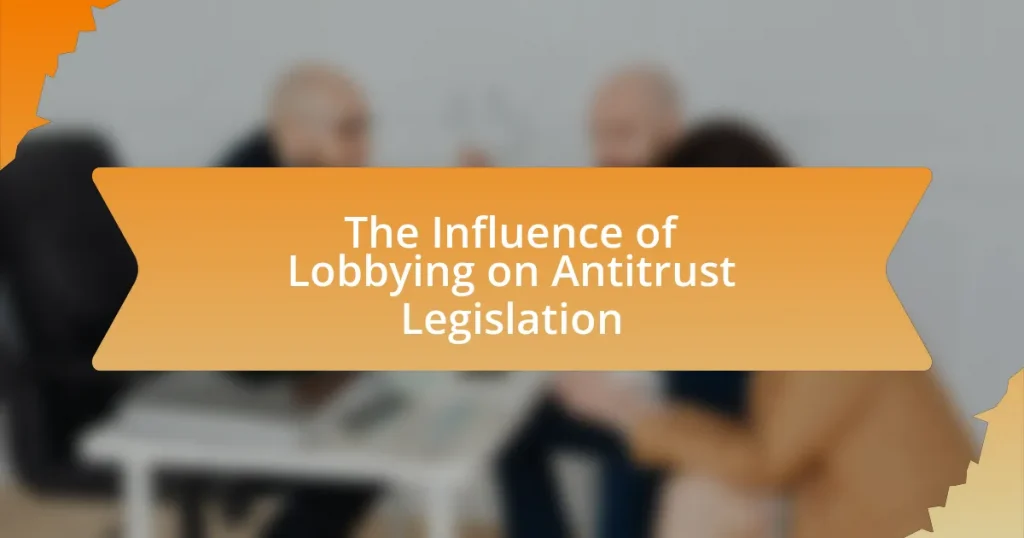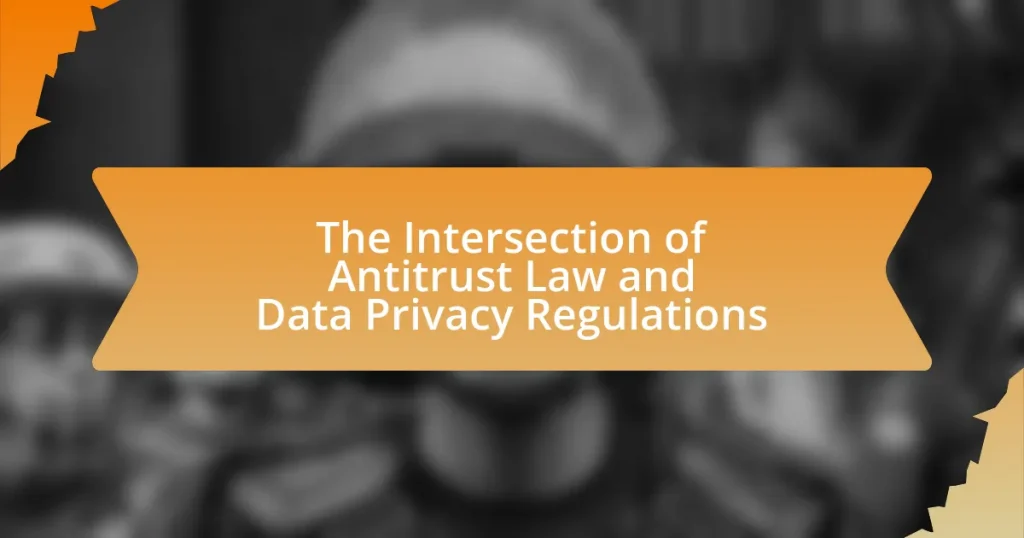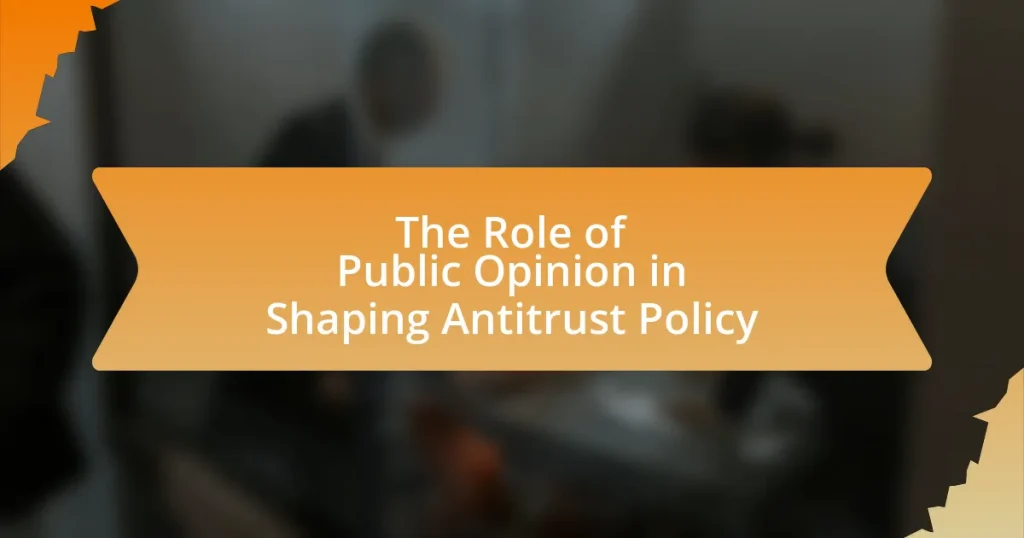The article examines the significant influence of lobbying on antitrust legislation, highlighting how lobbyists shape policy outcomes and regulatory frameworks to favor specific industries. It discusses the strategies employed by lobbyists, such as direct lobbying, grassroots mobilization, and coalition building, and how these efforts impact the creation and enforcement of antitrust laws. The article also explores historical examples of lobbying’s effects on antitrust regulations, the role of political contributions, and the potential drawbacks, including regulatory capture. Additionally, it emphasizes the importance of transparency and best practices for policymakers to mitigate the negative effects of lobbying on market competition and consumer welfare.
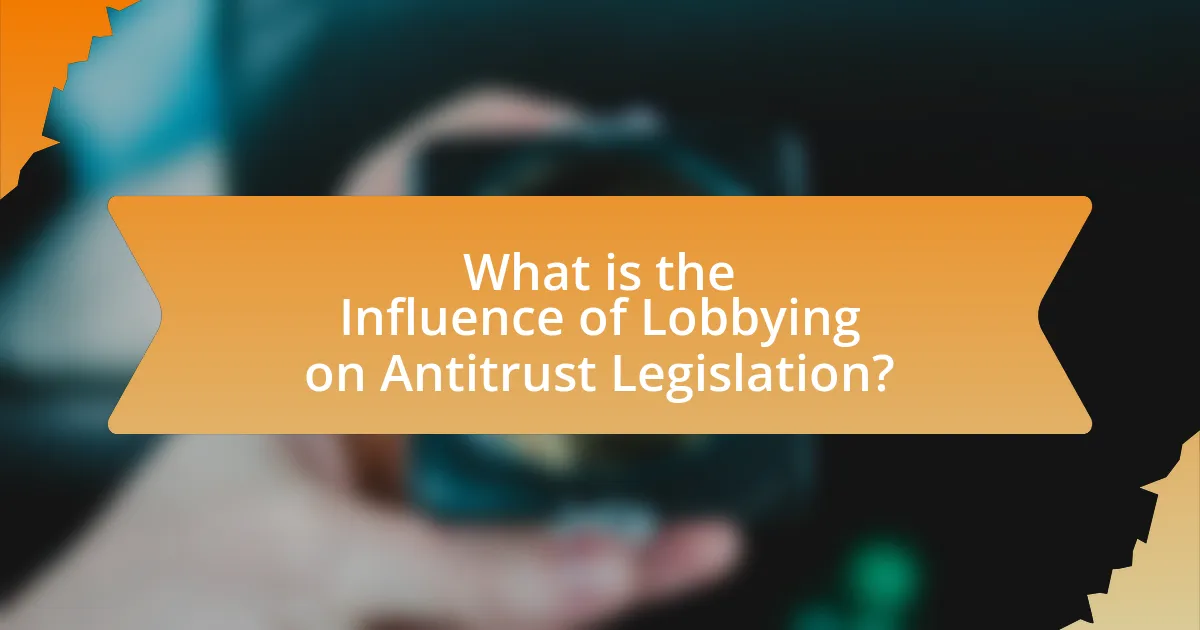
What is the Influence of Lobbying on Antitrust Legislation?
Lobbying significantly influences antitrust legislation by shaping policy outcomes and regulatory frameworks. Lobbyists representing various industries often advocate for specific interests, which can lead to the dilution or strengthening of antitrust laws. For instance, in the 2010s, major technology companies invested heavily in lobbying efforts, resulting in a more favorable regulatory environment that allowed for increased market consolidation. According to the Center for Responsive Politics, the technology sector spent over $100 million annually on lobbying, which correlates with a lack of stringent antitrust actions against these companies during that period. This demonstrates how lobbying can directly impact the enforcement and evolution of antitrust legislation.
How does lobbying impact the creation of antitrust laws?
Lobbying significantly influences the creation of antitrust laws by shaping policymakers’ perceptions and priorities. Corporations and industry groups often engage in lobbying to advocate for regulations that favor their interests, which can lead to weakened antitrust measures or exemptions. For instance, the American Bar Association reported that lobbying efforts by large tech companies have contributed to delays in the implementation of stricter antitrust regulations aimed at promoting competition. This demonstrates how lobbying can result in legislation that may prioritize corporate interests over consumer protection and market fairness.
What are the key lobbying strategies used in antitrust legislation?
Key lobbying strategies used in antitrust legislation include direct lobbying, grassroots mobilization, coalition building, and public relations campaigns. Direct lobbying involves engaging with lawmakers and their staff to influence policy decisions, often through meetings and providing research or data that supports a specific position. Grassroots mobilization focuses on rallying public support to create pressure on legislators, utilizing social media and community outreach to amplify voices. Coalition building brings together various stakeholders, including businesses, trade associations, and advocacy groups, to present a united front and strengthen their influence. Public relations campaigns aim to shape public perception and inform the media about the implications of antitrust legislation, often highlighting potential economic impacts or consumer benefits. These strategies are validated by numerous case studies, such as the lobbying efforts surrounding the 2010 Dodd-Frank Act, where various industries mobilized to influence regulatory outcomes.
How do lobbyists influence policymakers in antitrust matters?
Lobbyists influence policymakers in antitrust matters primarily through direct communication, financial contributions, and the provision of information. They engage in meetings with legislators and their staff to advocate for specific policies that align with the interests of the industries they represent. For instance, the American Antitrust Institute reported that lobbying efforts often include drafting legislation or regulatory proposals that favor certain business practices, thereby shaping the legal landscape. Additionally, financial contributions to political campaigns can create a favorable environment for lobbyists’ agendas, as seen in the 2020 election cycle where over $1 billion was spent on lobbying related to antitrust issues. This combination of direct advocacy and financial influence significantly impacts policymakers’ decisions regarding antitrust enforcement and regulation.
Why is lobbying significant in the context of antitrust legislation?
Lobbying is significant in the context of antitrust legislation because it shapes the regulatory environment by influencing lawmakers and public policy. Corporations and interest groups engage in lobbying to advocate for favorable interpretations of antitrust laws, which can lead to either stricter enforcement against competitors or more lenient regulations that benefit their market position. For example, in 2021, major tech companies spent millions on lobbying efforts to influence antitrust legislation aimed at curbing their market power, demonstrating how financial resources can impact legislative outcomes. This interaction between lobbying and antitrust policy highlights the power dynamics in regulatory frameworks, where vested interests can sway the balance of competition and market fairness.
What historical examples illustrate lobbying’s impact on antitrust laws?
Historical examples illustrating lobbying’s impact on antitrust laws include the efforts of the American Telephone and Telegraph Company (AT&T) in the 1980s and the influence of the pharmaceutical industry in the 2000s. AT&T lobbied extensively to shape the regulatory environment surrounding telecommunications, which culminated in the 1982 breakup of the company under antitrust laws, demonstrating how lobbying can both challenge and reinforce regulatory frameworks. Similarly, the pharmaceutical industry has lobbied against stricter antitrust enforcement, particularly regarding mergers and acquisitions, which has led to significant consolidation in the industry without substantial regulatory pushback. These instances highlight how lobbying can directly affect the enforcement and evolution of antitrust laws.
How does public perception of lobbying affect antitrust legislation?
Public perception of lobbying significantly influences antitrust legislation by shaping lawmakers’ responses to corporate interests. When the public views lobbying negatively, it can lead to increased scrutiny and calls for stricter regulations on monopolistic practices. For instance, high-profile lobbying scandals, such as the 2008 financial crisis, resulted in a public outcry that prompted legislative reforms aimed at enhancing competition and curbing corporate power. Conversely, if lobbying is perceived positively, it may result in more lenient antitrust enforcement, as lawmakers may prioritize economic growth over regulatory intervention. This dynamic illustrates how public sentiment can directly impact the legislative process surrounding antitrust laws.

What are the mechanisms through which lobbying affects antitrust legislation?
Lobbying affects antitrust legislation primarily through direct influence on policymakers, information dissemination, and shaping public opinion. Lobbyists engage with legislators to advocate for specific interests, often providing data and research that support their positions, which can lead to favorable legislative outcomes. For instance, the American Antitrust Institute has documented instances where lobbying efforts have successfully altered proposed regulations or delayed enforcement actions against monopolistic practices. Additionally, lobbying organizations often mobilize grassroots campaigns to sway public sentiment, which can pressure lawmakers to align with the interests of their constituents or donors. This multifaceted approach demonstrates how lobbying can significantly shape the framework and enforcement of antitrust laws.
How do interest groups engage in lobbying for antitrust issues?
Interest groups engage in lobbying for antitrust issues by advocating for specific legislative changes and influencing policymakers through various strategies. These strategies include direct communication with legislators, funding political campaigns, and mobilizing public opinion to create pressure for antitrust reforms. For instance, the American Antitrust Institute actively promotes competition policy and engages with lawmakers to shape antitrust legislation, demonstrating the effectiveness of organized lobbying efforts in this domain.
What types of organizations typically lobby on antitrust matters?
Organizations that typically lobby on antitrust matters include trade associations, corporations, and public interest groups. Trade associations, such as the American Bar Association, advocate for specific industries and seek to influence antitrust regulations that affect their members. Corporations, particularly those in highly concentrated markets, engage in lobbying to protect their competitive interests and influence regulatory outcomes. Public interest groups, like consumer advocacy organizations, lobby to promote competition and prevent monopolistic practices, emphasizing the need for fair market conditions. These entities collectively shape the discourse around antitrust legislation, reflecting diverse interests and perspectives in the regulatory landscape.
How do these organizations prioritize their lobbying efforts?
Organizations prioritize their lobbying efforts by focusing on key issues that align with their strategic goals and the interests of their stakeholders. They assess the political landscape, identify influential policymakers, and allocate resources to issues that have the highest potential for impact, such as specific antitrust regulations that could affect their operations. For instance, a study by the Center for Responsive Politics found that industries like technology and pharmaceuticals invest heavily in lobbying to shape antitrust policies that could hinder their market dominance. This targeted approach ensures that their lobbying efforts are efficient and effective in influencing legislation.
What role do political contributions play in lobbying for antitrust legislation?
Political contributions significantly enhance lobbying efforts for antitrust legislation by providing financial support that can influence lawmakers’ decisions. These contributions often create a favorable environment for lobbyists representing corporations or interest groups, as they can leverage their financial backing to gain access to policymakers. For instance, research indicates that industries facing antitrust scrutiny, such as technology and pharmaceuticals, frequently increase their political contributions to ensure their interests are represented in legislative discussions. This financial influence can lead to more favorable regulatory outcomes, as lawmakers may prioritize the interests of their contributors over broader public concerns.
How do campaign donations influence legislative outcomes?
Campaign donations significantly influence legislative outcomes by shaping the priorities and actions of elected officials. When politicians receive substantial financial contributions from donors, particularly those with vested interests, they may feel compelled to align their legislative agendas with the preferences of these contributors. Research indicates that legislators who receive higher campaign contributions are more likely to support policies that benefit their donors. For instance, a study published in the American Economic Review found that a 10% increase in campaign contributions correlates with a 1% increase in the likelihood of a legislator voting in favor of the donor’s interests. This dynamic creates a direct link between financial support and legislative behavior, illustrating how campaign donations can effectively sway policy decisions in favor of specific industries or groups.
What regulations exist regarding political contributions in lobbying?
Regulations regarding political contributions in lobbying are primarily governed by the Federal Election Commission (FEC) and the Lobbying Disclosure Act (LDA). The FEC enforces limits on contributions to federal candidates, parties, and political action committees, while the LDA requires lobbyists to register and disclose their activities, including any political contributions made. For instance, individuals and organizations are prohibited from making contributions in exchange for lobbying favors, and violations can lead to significant penalties. Additionally, many states have their own laws that further regulate political contributions in the context of lobbying, ensuring transparency and accountability in the political process.
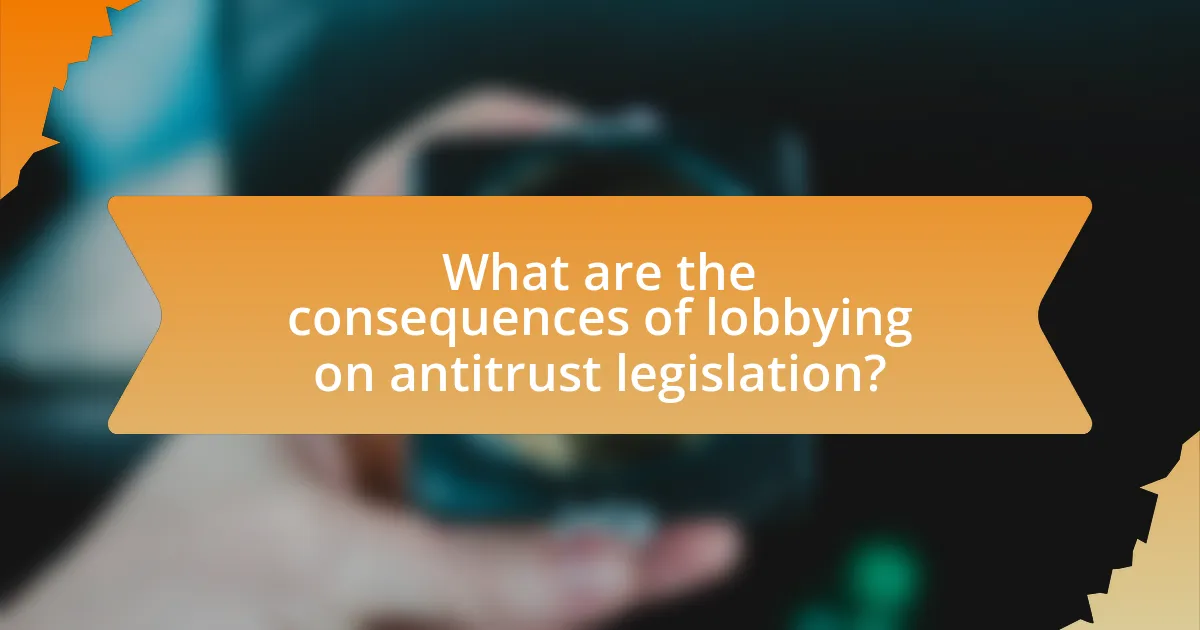
What are the consequences of lobbying on antitrust legislation?
Lobbying significantly influences antitrust legislation by shaping the regulatory environment to favor specific industries or companies. This influence often leads to weakened enforcement of antitrust laws, allowing monopolistic practices to flourish, which can stifle competition and innovation. For instance, the American Antitrust Institute reported that lobbying efforts by large corporations have resulted in legislative changes that dilute antitrust protections, thereby enabling these entities to consolidate market power. Additionally, lobbying can create barriers for smaller competitors, as they may lack the resources to counteract the lobbying efforts of larger firms, ultimately harming consumer choice and market dynamics.
How does lobbying shape the effectiveness of antitrust laws?
Lobbying significantly shapes the effectiveness of antitrust laws by influencing legislative outcomes and regulatory enforcement. Corporations and industry groups often engage in lobbying to sway policymakers, which can lead to weakened antitrust regulations or selective enforcement that favors certain businesses. For instance, the American Antitrust Institute has documented cases where lobbying efforts resulted in delays or modifications to antitrust investigations, undermining the intended purpose of these laws to promote competition and prevent monopolistic practices. This dynamic illustrates how lobbying can create an environment where powerful interests can circumvent or dilute the enforcement of antitrust laws, ultimately impacting market competition and consumer welfare.
What are the potential drawbacks of lobbying on antitrust enforcement?
Lobbying on antitrust enforcement can lead to significant drawbacks, including the potential for regulatory capture, where lobbyists influence regulators to favor specific industries or companies over public interest. This can result in weakened enforcement of antitrust laws, allowing monopolistic practices to flourish, which ultimately harms competition and consumers. For instance, the American Antitrust Institute has noted that excessive lobbying can distort the regulatory process, leading to decisions that prioritize corporate interests rather than promoting fair market competition. Additionally, lobbying can create an uneven playing field, where well-funded corporations can exert disproportionate influence compared to smaller competitors, further entrenching market power and reducing innovation.
How can lobbying lead to regulatory capture in antitrust policy?
Lobbying can lead to regulatory capture in antitrust policy by allowing special interest groups to exert undue influence over regulatory agencies. This occurs when lobbyists, representing powerful corporations, provide information, resources, or incentives that align regulatory outcomes with their interests rather than the public good. For instance, the American Antitrust Institute has documented cases where lobbying efforts have resulted in weakened enforcement of antitrust laws, illustrating how regulatory agencies may prioritize the preferences of well-funded lobbyists over consumer welfare. This dynamic can create a situation where regulatory bodies become more responsive to the industries they are meant to regulate, undermining the effectiveness of antitrust policy.
What strategies can be employed to mitigate the negative effects of lobbying?
To mitigate the negative effects of lobbying, implementing transparency regulations is essential. Transparency measures, such as mandatory disclosure of lobbying activities and expenditures, can help ensure that the public and policymakers are aware of the influences shaping legislation. For instance, the Lobbying Disclosure Act in the United States requires lobbyists to register and report their activities, which has increased accountability. Additionally, establishing stricter limits on campaign contributions from lobbyists can reduce undue influence on elected officials. Research indicates that jurisdictions with stringent lobbying regulations experience less corruption and more equitable policy outcomes, demonstrating the effectiveness of these strategies in curbing the adverse impacts of lobbying on antitrust legislation.
How can transparency in lobbying improve antitrust legislation?
Transparency in lobbying can improve antitrust legislation by ensuring that policymakers have access to clear information about the interests and motivations behind lobbying efforts. When lobbying activities are transparent, it becomes easier to identify potential conflicts of interest and undue influence from powerful corporations, which can distort market competition. For instance, the Lobbying Disclosure Act of 1995 in the United States mandates that lobbyists register and report their activities, which has led to increased scrutiny of lobbying practices and greater accountability. This transparency allows legislators to make more informed decisions that prioritize fair competition and consumer welfare, ultimately leading to stronger antitrust enforcement.
What best practices can policymakers adopt to balance lobbying influence?
Policymakers can adopt transparency measures, such as mandatory disclosure of lobbying activities and funding sources, to balance lobbying influence. By requiring lobbyists to register and report their expenditures, policymakers can create a clearer picture of who is influencing legislation. For instance, the Lobbying Disclosure Act in the United States mandates such disclosures, which has led to increased public awareness and scrutiny of lobbying practices. Additionally, implementing strict limits on campaign contributions from lobbyists can reduce their financial influence on policymakers, as seen in various states that have enacted contribution caps. These practices help ensure that lobbying does not overshadow the public interest in the legislative process.
